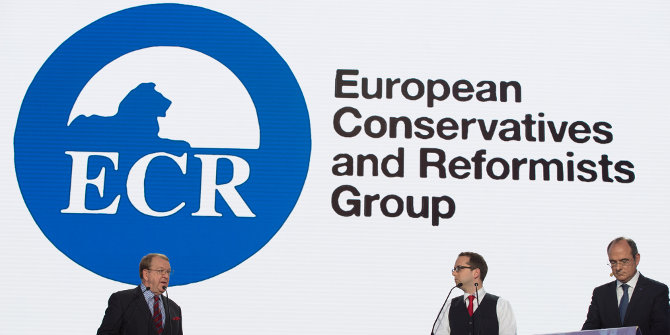Several commentators in Europe have raised concerns that Donald Trump’s presidential election victory could undermine NATO and damage European security and defence. Antonio Calcara writes that while these concerns may be valid, Trump’s election also presents a key opportunity to strengthen EU defence policy. He argues that this should be achieved not through large-scale political integration, but instead by using existing measures contained in the Lisbon Treaty to enhance cooperation between member states.

When the US holds a presidential election, the result determines changes across the whole of the international arena. And victory for a candidate like Trump, who, during the election campaign, showed a willingness to adopt a decisive turn in both domestic and foreign policy, makes an analysis of this impact on global affairs of obvious relevance. But while many in Europe have viewed Trump’s election as a negative development, it could also be considered a real opportunity for Europe to strengthen its Common Security and Defence Policy (CSDP)
There are two main reasons for this. The first is that Trump’s approach to the United States’ international alliances – chiefly NATO – may destabilise transatlantic relations to such a point that it convinces European countries to come together as a way of counterbalancing the potential loss of US protection. The second reason is that Trump’s position on Russia could push states in Central and Eastern Europe to change their attitudes toward EU defence. However, while traditionally policy proposals in the area of EU defence have focused on the need for greater political integration among the member states, the CSDP would benefit most from a pragmatic approach, based largely on the implementation tools contained in the Lisbon Treaty.
Trump’s election and European defence
Trump’s foreign policy statements may well have been relatively erratic, even incoherent, but there are nevertheless some key themes that can already be identified in his approach, most notably in relation to NATO and Russia.
His discourse on NATO has two main elements. On the one hand, he has accused NATO of being an obsolete instrument, built in a bipolar geopolitical situation, which is unfit for facing new challenges like international terrorism. On the other, he has criticised European countries for not contributing sufficient resources to NATO’s maintenance costs. Trump is no longer willing to tolerate a situation in which the US contributes 72 percent of the costs of the Alliance.
On Russia, this approach to NATO becomes even more important. Trump has repeatedly suggested that Russia should not be viewed as a hostile enemy, but rather as a key geopolitical power that can potentially offer useful cooperation in tackling common enemies, such as Al-Qaeda and the so called Islamic State.
Trump’s approach has caused clear concern among European and NATO allies. NATO Chief Jens Stoltenberg, speaking after the election, reminded Trump that the Alliance is crucial not only for European security, but also for the United States, as evidenced by the fact that the only time Article 5 has been invoked, was after the 9/11 terrorist attacks against the United States. European governments, after having openly supported Hillary Clinton, have not hidden their worries about Trump’s foreign policy towards Europe. The German Minister of Defence, the morning after the election, immediately expressed shock and concern, in particular with regard to Trump’s views on NATO.
EU defence cooperation
If one considers the main historical events that have led to EU defence cooperation, it is evident that it has progressed through so called ‘critical junctures’ – specific, historical moments in which there are clear alternative paths to choose from – rather than internal evolutionary processes. These include the end of the Cold War, when member states identified an opportunity to play a more effective unified role after the demise of the Warsaw Pact, as well as the EU’s military failure to address the violence that emerged during the breakup of Yugoslavia in the 1990s.
Some commentators have cited Brexit as one such opportunity. But it is the presence of NATO, rather than the UK’s EU membership, that has blocked the development of a credible and coherent EU security and defence policy. The real problem with European defence cooperation has not been the threat of a UK veto over specific actions, but rather the more general divergences that exist in the foreign policy positions of EU member states. The non-interventionist position of Germany in Libya is a case in point.
Moreover, the majority of EU member states have always relied on NATO for security and defence issues. Even in the EU’s new Global Strategy, NATO is described as the “main framework when it comes to collective defence”. Only NATO had the operational planning to conduct the 2011 intervention in Libya. EU member states have so far lacked an incentive to change this arrangement, particularly with regard to Central and Eastern European states who have experienced difficult relations with Russia, and rely on NATO’s framework for protection. Trump’s change of course presents an obvious ‘critical juncture’ in this context.
Pragmatic cooperation rather than integration
Much of the recent discussion around EU defence cooperation has focused on the creation of a ‘European army’ or a permanent EU military headquarters. Although such plans are ambitious, they are also likely to produce only very general proposals. What the EU requires first and foremost is a more pragmatic approach based on the full implementation of the measures contained in the Lisbon Treaty and on some additional measures to incentivise member states to cooperate through the EU’s framework.
The Lisbon Treaty contains several ambitious provisions: a mutual assistance and a solidarity clause, the expansion of the so called ‘Petersberg tasks’, and the creation of the European External Action Service (EEAS) under the authority of the High Representative for Foreign Affairs and Security Policy. However, the treaty also introduced ‘permanent structured cooperation’, which enabled the possibility for EU states to cooperate more closely with one another in individual cases. Encouraging member states to take advantage of this instrument, which allows cooperation in a highly flexible way, could overcome many of the problems that currently exist in terms of agreeing joint positions.
Another much overlooked element of the Lisbon Treaty framework is the potential for pooling and sharing military resources, with cooperative projects in the research and technological sectors. These are preliminary conditions for sustaining an independent EU defence position at the international level. Trump’s election could also provide an opportunity to discuss the budget of the European Defence Agency (EDA), which was created to support the European Council and member states in improving defence capabilities. In this case, Brexit could also provide an opportunity as the UK will no longer be able to block budget increases.
The increase of the EDA’s own budget should be complemented by an increase of European funds in research for dual-use civilian-military technologies in areas like communication, reconnaissance, transport, medical and logistics. The examples of high tech EU programmes like Copernicus and Galileo and the Medium-Altitude Long Endurance Unmmaned Aircraft System (MALE-UAS) show how investments in technology will help not only the Union’s military capabilities, but also the growth and development of the European economy as a whole. The EDA could act as the EU coordinator of all defence research projects.
Finally, it will also be necessary to renegotiate the relationship between the EU and NATO on the subject of collaborative defence projects. The initiatives of Pooling and Sharing (under the EU umbrella) and Smart Defence (under the NATO framework) overlap geographically and functionally, making it difficult to create a single framework through which sharing military assets.
An opportunity
Ultimately, Trump’s election could be a significant opportunity for EU security and defence policy. The US positions on NATO and Russia are the two key factors that will influence not only the transatlantic relationship, but also intra-European relations in the field of security and defence. However, it is difficult to predict the development of a Trump presidency in the medium and long term. Even If Trump wanted to reshape American foreign policy, US interests in the world are not disappearing overnight and, as his European allies hope, Trump’s foreign policy might be more pragmatic than most commentators anticipate.
In any case, Trump’s election, as evidenced by the concerned statements of various European defence ministers, is the “critical juncture” that some EU stakeholders have been waiting for to transform Europe into a credible military actor. However, even with incentives to do that, it is now up to the EU member states to find a balance between their strong interest in sharing military resources and cooperating at the EU level, and their equally strong willingness to defend sovereignty in such a sensitive and secretive area.
Please read our comments policy before commenting.
Note: This article gives the views of the author, and not the position of EUROPP – European Politics and Policy, nor of the London School of Economics. Featured image: public domain.
Shortened URL for this post: http://bit.ly/2fa6P2i
_________________________________
Antonio Calcara – LUISS
Antonio Calcara is a PhD Candidate at the LUISS Department of Political Science – Rome. His research interests are in the areas of European Union Foreign and Security Policy, EU Defence, International Relations and Security Studies.




